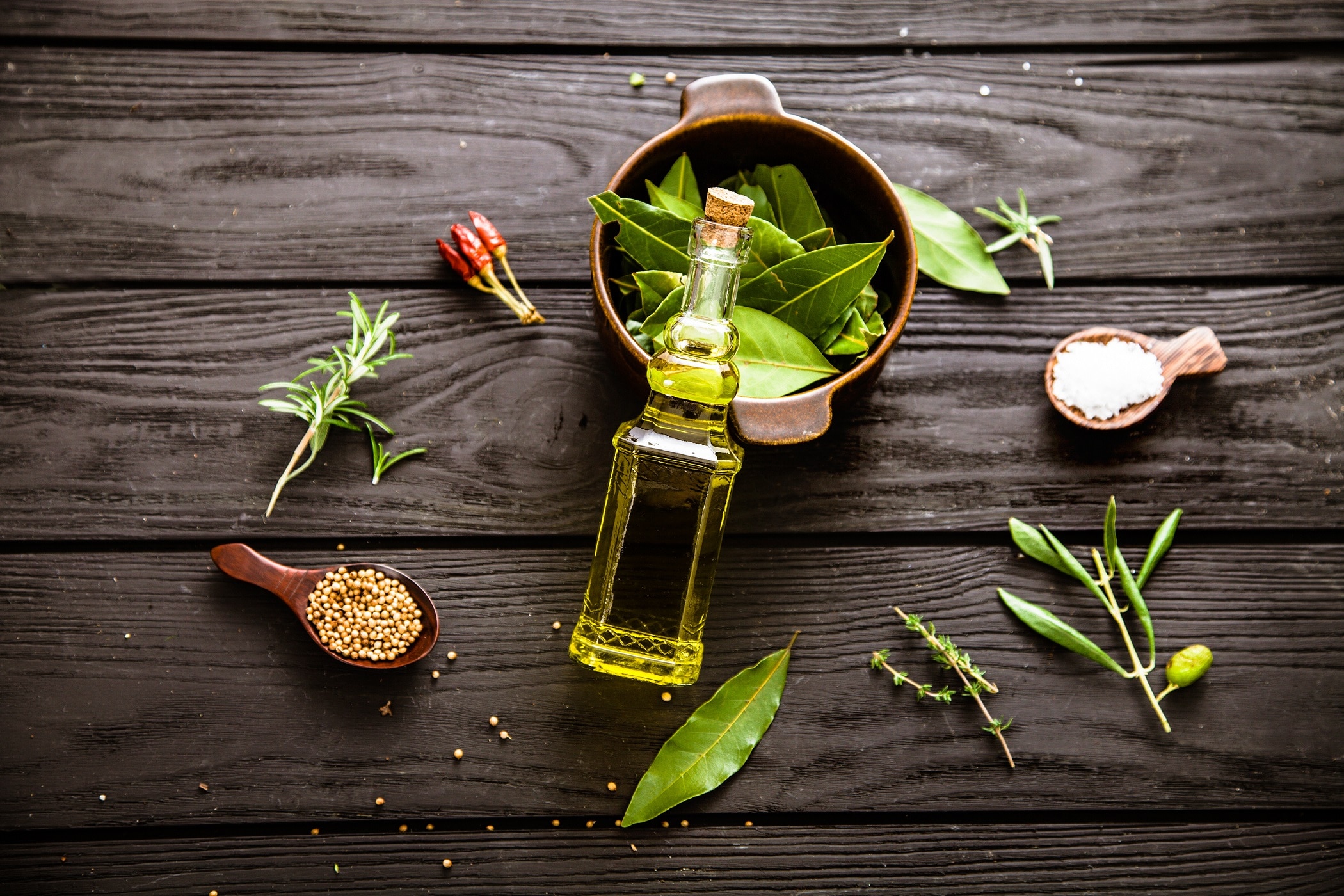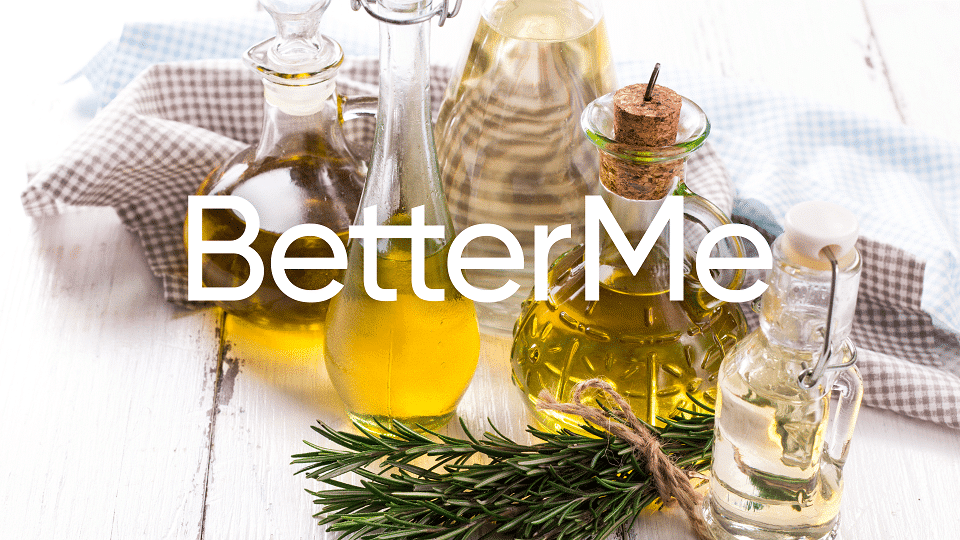There are so many cooking oils to choose from these days. This may leave you wondering which one is the best in terms of nutrition and health benefits. Canola and other vegetable oils appear to be the most commonly used oils in most households. But of the two, do you know which is the healthiest? We can help you answer this question. Today we will look at a comprehensive comparison of canola oil vs vegetable oil. The two may seem interchangeable, but they are indeed very different. We will discuss their differences, nutrition facts, benefits, and side effects. Take a look.
Get your personalized
meal plan!
What Is Canola And Vegetable Oil?
Canola oil is a vegetable-based oil. The term canola comes from Canada and Ola, which means oil (1). The term Canada was considered because scientists in Canada created this oil through the crossbreeding process of an edible rapeseed plant (1).
During the crossbreeding process, the scientists removed toxic compounds present in the plant, known as glucosinolates and erucic acid (1). Vegetable oil refers to oil extracted from seeds or various parts of plants.
Contrary to what the name implies, vegetable oil is not necessarily extracted from vegetables. Instead, it can be obtained from grains, nuts, seeds, and different types of fruits (5). The most common types of vegetable oils include soybean, sunflower, and coconut oil.
Vegetable Oil Vs Canola Oil Nutrition Facts
When looking at the differences between these two oils, it is vital first to understand their nutritional differences. Each of this oil has a different profile. For better insight, let us evaluate the nutritional content in a 100 g serving of vegetable and canola oil:
-
Vegetable Oil
According to the U.S. Department of Agriculture, a 100 g serving of vegetable oil has the following nutrients (10):
Calories- 886
Total fat- 100 g
Protein- 0 g
Total carbohydrates- 0 g
-
Canola Oil
On the flip side, the U.S. Department of Agriculture acknowledges that a 100 g serving of canola oil contains the following nutrients (2):
Calories- 857
Total fat- 100 g
Protein- 0 g
Total carbohydrates- 0 g
Read More: Olive Oil Diet For Weight Loss And Other Health Benefits
Vegetable Oil Vs Canola Oil Calories
Note that the calorie count of either oil varies depending on the serving. For example, if you were to use a tablespoon of canola oil, the calorie count would be 124 (1). Notice that the calorie count has reduced compared to a 100 g serving of the same oil.
The same thing applies to vegetable oil. One tablespoon of vegetable oil contains 120 calories, whereas a 100 g serving contains 886 calories.
Nutrition Differences Between Canola And Vegetable Oil
The most significant difference in the nutrition facts of these two oils lies in their fat content. Let us evaluate the fat profile in one tablespoon of canola and vegetable oil for better insight. Take a look (12):
-
Canola Oil
Total fat- 14 g
Saturated fatty acids- 1 g
Monounsaturated fatty acids- 8 g
Polyunsaturated fatty acids- 4 g
-
Vegetable Oil
Total fat- 14 g
Saturated fatty acids- 2 g
Monounsaturated fatty acids- 3 g
Polyunsaturated fatty acids- 8 g
From this analysis, what we draw is that:
- Canola oil has the lowest level of saturated fat.
- Canola oil has a higher monounsaturated fat composition, which is considered as a potentially heart-healthy fat.
- Pure vegetable oil has the most composition of polyunsaturated fatty acids, which include the essential omega-6 and omega-3 fatty acids.
In addition to this, researchers have also added that canola oil may contain small traces of trans fats, which are considered harmful to your health. Similarly, they have found this oil to contain (1):
- No traces of gluten or soy.
- Polyunsaturated fatty acids, such as linoleic acid or omega-6 fatty acid (21%) and alpha-linoleic acid, an omega-3 fatty acid (11%).
On the flip side, researchers have also discovered vegetable oil (12):
- May contain traces of trans fats, especially partially hydrogenated vegetable oil.
- Are not stable at high temperatures.
BetterMe app will kick you out of the mental funk, shake off your extra weight, rid you off your energy-zapping habits, and help you sculpt the body of your dreams. Intrigued? Hurry up and change your life for the better!
Cooking With Vegetable And Canola Oils
Both oils react to heat, which is why you must understand what happens when you cook with either oil. Here is a look at what happens:
-
Canola Oil
Researchers warn against cooking with canola oil at high heat and for an extended duration. This is because of a chemical reaction that releases potentially harmful compounds (12).
That said, use another oil with a high smoke point if you are cooking a dish that requires high heat or a long duration, such as roasting vegetables. For example, food experts suggest using canola oil when sautéing meat or meat alternatives. This way, the oil does not get too hot or stay at such high temperatures for long (12).
-
Vegetable Oil
Some vegetable oil is similar to canola oil in that it is not stable at high temperatures. When heated for too long, it releases potentially harmful compounds, leading to several conditions (12). Researchers state that these toxic compounds may increase your risk of cancer, Parkinson’s disease, and Alzheimer’s disease (12). Vegetable oils may be better suited to baking or other applications that use more moderate heat.
In light of this, talk to your nutritionist if you are interested in preparing dishes that take longer to cook and require high heat. There are specific plant-based oils that can better handle high temperatures.
Can You Substitute Vegetable Oil For Canola Oil?
Both canola and vegetable oil have been used interchangeably by chefs in the kitchen. This stems from the fact that both have neutral flavors and moderately high smoke points. One of the world’s great chefs, Gordon Ramsay, says that you can substitute canola for vegetable oil and vice versa (6). Please note, he adds that you can opt for canola oil with its specific heart healthy fat content if you are concerned about the fat profile.
Benefits Of Canola Oil Vs Vegetable Oil
Now we will begin by discussing the benefits of canola oil, and the research backed-up benefits are as follows:
-
Reduced Cholesterol Levels
Canola oil has monounsaturated fats that may help lower LDL cholesterol levels. As a result, it is believed to help reduce the risk of heart disease, complications of diabetes, and other health problems associated with high cholesterol (3).
-
Better Heart Health
Canola oil has mostly unsaturated fats. Research ties replacing saturated fats in the diet with unsaturated fats to reduced heart disease risk (3).
Read More: 14-Day Boiled Egg Diet: Will It Yield Any Long-Term Results?
-
Better Skin Health
Canola oil can promote better skin health by containing nutrients that may help reduce skin problems and aging signs like wrinkles, posts, blemishes, and wrinkles. The rationale is that this occurs due to its rich vitamins E and K content.
These two vitamins have been found essential in protecting and maintaining healthy skin, hair, and nails (11). In addition, they can help make your skin look healthy and youthful, possibly resulting in fewer spots, blemishes, and wrinkles (11).
-
Rich In Fatty Acids
Canola oil also contains both the omega-3 and omega-6 fatty acids that your body needs. Your body needs omega-3 fatty acids for functioning cell receptors in the cell membranes. They are also vital for blood clotting and the contraction and relaxation of the artery walls (7).
Other possible benefits that are linked to canola oil but lack enough evidence to back them up. These potential benefits include (3):
- Lowering blood pressure due to the docosahexaenoic acid (DNA) in it.
- Controlling blood sugar levels.
- Reducing the severity of nonalcoholic fatty liver disease (NAFLD).
The possible benefits of using vegetable oil are somewhat similar to those of canola oil. They include (5):
-
Reduced Risk Of Diseases
Vegetable oils contain monounsaturated fats like omega-9 fatty acids which contribute to healthy cholesterol levels. In addition, according to WebMD, these fatty acids may help reduce the risk of heart diseases (5).
-
Packed With Nutrients
Vegetable oil is packed with the vitamins and nutrients that your body needs to perform several processes. For example, different vegetable oils are packed with fat-soluble vitamins A, D, and E.
-
Excellent Source Of Energy
Vegetable oils are also an excellent source of energy, which helps enhance your day to day functioning.
Side Effects Of Canola Oil And Vegetable Oil
Despite being beneficial, these two types of cooking oils also have several drawbacks. It is essential to familiarize yourself with these drawbacks to avoid falling into health pitfalls. Let us begin by looking at the side effects of canola oil. Take a look:
Canola Oil Side Effects
One of the drawbacks of canola oil is that it is not acquired from a non GMO plant. Instead, as we discussed earlier, the seed that produces this oil is crossbred in the lab, meaning it is obtained from genetically modified plants, better known as GMOs.
Although this does not make it an unhealthy oil option, the concept of genetic modification in our food supply is controversial. The debates surrounding the safety of GMO products have been ongoing for years, and it would be an oversimplification to state unequivocally whether GMOs are healthy or unhealthy.
Additionally, as we discussed earlier, canola oil has been found to contain traces of trans fats. Trans fats are considered a danger to your health because they lower HDL levels and raise LDL “bad” cholesterol levels in the blood (4).
As a result, cholesterol builds up in your arteries, increasing your risk of coronary heart disease and stroke (4). On the other hand, the overall fatty acid profile of canola oil is one of the most heart healthy, so it’s likely that the benefits from the unsaturated fatty acids outweigh the risks of any possible trace amounts of trans fat.
Drawbacks Of Vegetable Oil
Vegetable oil might also contain trans fats, especially if it is hydrogenated, which, as we have discussed, is linked to increased risk of cardiovascular disease, diabetes and obesity. Additionally, you may want to regulate the use of vegetable oil due to its high content of omega-6 fatty acids.
Generally, our body cannot make omega-6 or omega-3 fatty acids despite them being essential nutrients in the body. This means that you need to obtain them from your diet. That said, getting the proper balance of these fatty acids is important, and most people who eat a western-style diet tend to get more omega-6s than they need and not enough omega-3s..
Too many omega-6 fatty acids in the diet can raise triglyceride levels (8). When these levels are high, your arteries tend to harden and thicken, causing arteriosclerosis. Arteriosclerosis increases your risk of heart attack, heart disease, and stroke (9).
Likewise, high intakes of omega-6 fatty acids increases the risk of high blood pressure among people with diabetes (8). They may also lead to breathing difficulties in people with chronic obstructive pulmonary disease (COPD) (8).
Researchers also acknowledge that too much omega-6 fatty acid (more than 10% of daily calories) is unsafe in pregnancy because they increase the risk of having a tiny infant or one with eczema (8). So, before adding any vegetable oil to your diet, make sure you talk to your doctor. Remember to let them know if you have an underlying medical condition or are pregnant.
Lean and toned up body isn’t just a far-fetched fantasy. Check out the BetterMe app and watch it propel your weight loss journey into high gear!
Canola Oil Vs Vegetable Oil: Which Is Healthier?
The debate between the healthiest fat option between canola and vegetable oil has been there for years. Depending on which oil you want to use, you will hear different running theories. For example, if you are interested in using canola oil, you might hear its supporters claiming that it is the healthier of the two.
The rationale is that it is the healthier option due to its higher content of monounsaturated fat compared to vegetable oil. On the flip side, vegetable oil users may claim that it is the best because all plant-based oils are considered heart-healthy.
But of which of the two does science consider healthy? Neither because, as we have seen from our discussions above, science shows both oils have their advantages and drawbacks. So whatever oil you choose to use, make sure you understand its pros and cons and consult with a professional.
Brief Rundown
Based on our discussion, we can pinpoint some quick facts about both types of oil. Some of the facts about canola oil include:
- Is crossbred in the lab.
- Contains small amounts of saturated fats.
- Unstable at high temperatures.
- Has no gluten or soy.
- Is rich in monounsaturated fatty acids.
- May contain small amounts of trans fats.
- Packed with essential vitamins and minerals.
- Has its pros and cons.
- Number of calories drastically changes as you increase the servings.
- Is an excellent option when sautéing meat and its alternatives.
On the flip side, some of the facts of vegetable oil include:
- It is an umbrella representing different types of oil, such as soybean, sunflower, and coconut oil.
- Is obtained naturally from plants, seeds, and fruits.
- Calorie count varies depending on the servings.
- May contain traces of trans fats, especially partially hydrogenated vegetable oil.
- Lack enough oxidative stability in its natural form or when cooked for an extended duration.
- Has essential nutrients in varying amounts.
- Rich in polyunsaturated fats like omega-6 fatty acids.
- Has its benefits and drawbacks.
The Bottom Line
The debate of the healthiest oil between canola and vegetable oil has been in existence for years. The two oil varieties have for the longest been compared and contrasted in a bid to discover the healthiest.
In comparing canola oil vs vegetable oil, each oil is found to have its benefits and side effects. But, again, the nutrition profile differs due to the significant differences in fat content. So, seek professional help before adding either oil to your diet.
DISCLAIMER:
This article is intended for general informational purposes only and does not serve to address individual circumstances. It is not a substitute for professional advice or help and should not be relied on for making any kind of decision-making. Any action taken as a direct or indirect result of the information in this article is entirely at your own risk and is your sole responsibility.
BetterMe, its content staff, and its medical advisors accept no responsibility for inaccuracies, errors, misstatements, inconsistencies, or omissions and specifically disclaim any liability, loss or risk, personal, professional or otherwise, which may be incurred as a consequence, directly or indirectly, of the use and/or application of any content.
You should always seek the advice of your physician or other qualified health provider with any questions you may have regarding a medical condition or your specific situation. Never disregard professional medical advice or delay seeking it because of BetterMe content. If you suspect or think you may have a medical emergency, call your doctor.
SOURCES:
- All about canola oil (2021, medicalnewstoday.com)
- Canola Oil (2019, fdc.nal.usda.gov)
- Canola Oil – Uses, Side Effects, and More (2020, webmd.com)
- Facts about trans fats (2020, medlineplus.gov)
- Health Benefits of Vegetable Oil (2021, webmd.com)
- Learn the Difference Between Canola Oil and Vegetable Oil (2013, masterclass.com)
- Omega-3 Fatty Acids: An Essential Contribution (2021, hsph.harvard.edu)
- Omega-6 Fatty Acids – Uses, Side Effects, And More (2018, webmd.com)
- Triglycerides: Why do they matter? (2020, mayoclinic.org)
- Vegetable oil, NFS (2020, fdc.nal.usda.gov)
- Vitamin E: What’s It Good For? (2020, webmd.com)
- What are the most healthful oils? (2019, medicalnewstoday.com)















